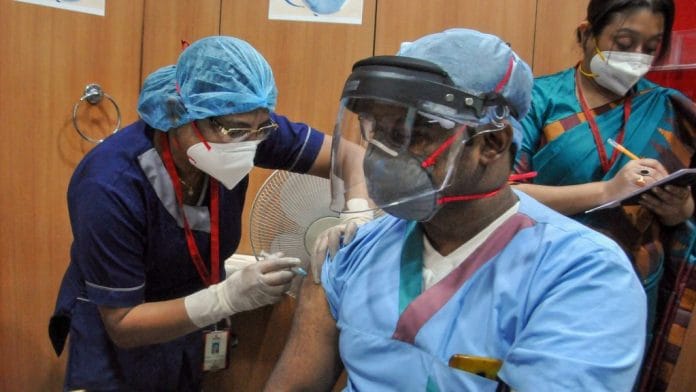New Delhi: The Delta variant (B.1.617.2) of the novel coronavirus is continuing to evolve, with a new variant — AY.1 — now emerging simultaneously in several countries, including India.
Scientists from the CSIR Institute of Genomics & Integrative Biology (IGIB) have noted that the new variant — B.1.617.2.1, which has been designated AY.1 for simplicity — is associated with immune escape properties, which render a pathogen partially or fully resistant to the body’s immune response, vaccines and antibody therapies.
So far, 156 samples of the variant have been sequenced around the world, with the first sample isolated in March this year from Europe. In India, the variant was first found in April. So far, eight samples have been isolated from India, according to data uploaded on GISAID, an open-access repository of SARS-CoV-2 sequenced from across the world.
Three samples were isolated from Tamil Nadu, and one sample each from Odisha, Karnataka, Andhra Pradesh, Gujarat and Maharashtra.
Along with the mutations in the spike protein that characterise the Delta variant, the AY.1 is defined by another acquired mutation, K417N. This mutation is also present in the Beta variant (B.1.351), which was first identified in Brazil.
“Understanding this continued evolution is of great importance in mapping the evolutionary landscape of emerging variants. Largely, the virus has tried to optimise for transmission and immune escape by step-wise acquisition of new mutations,” IGIB scientist Vinod Scaria said in a tweet on 13 June.
The K417N mutation is now being monitored by Public Health England, an agency of the UK government, after at least 35 samples were isolated in the country. Of these, two were people who had been completely vaccinated. However, none of the patients died.
Also read: Covid ‘X Men’ — the 7,000+ mutations in India, how to understand them & where they came from
‘Enhanced ability to evade immune system’
According to IGIB researchers, data suggests that there are already at least two separate clusters of people infected with the AY.1 variant. A small cluster — carrying the spike mutation A222V — is largely from the US state of California. The other, larger cluster, with sequences from eight other countries, including the UK, India and Nepal, carries the spike protein mutation T95I.
“Looking at the large (T95I) cluster, it seems like AY.1 has arisen independently a number of times and could be more prevalent than observed in countries with limited genomic surveillance,” Bani Jolly, a researcher at IGIB, pointed out in a Twitter thread Monday.
K417N, Jolly added, is associated with an enhanced ability of the virus to evade the immune system. “Given that Delta is a variant of concern, it is important to take note of any sub-lineages that may emerge,” she said.
A variant of concern is one with changed characteristics such as increased transmissibility or virulence, or detrimental to identified safety measures and diagnostics.
In his Twitter thread, Scaria said the mutation is linked to resistance to the monoclonal antibody therapy Casirivimab and Imdevimab, which is being marketed in India by Cipla.
Developed by the American biotechnology company Regeneron, this antibody cocktail was used to treat former US President Donald Trump in October last year when the therapy was still at an experimental stage.
The antibody cocktail received emergency-use authorisation from India’s Central Drugs Standard Control Organisation last month for use among mild and moderate patients — adults and minors (aged 12 and above, weighing at least 40 kg) — who are at risk of developing severe disease.
(Edited by Sunanda Ranjan)
Also read: Gangrene, hearing loss indicate India’s Delta variant of Covid is more severe, doctors say






